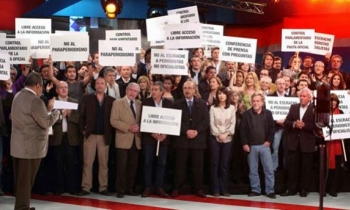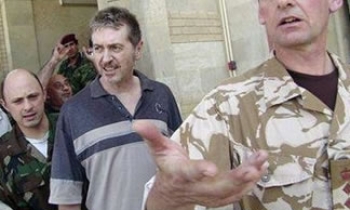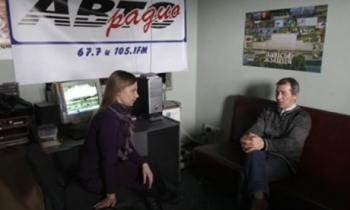It began innocuously enough. Last year the Danish writer Kare Bluitgen had been searching for someone who could illustrate his children's book about the life of the prophet Muhammad. It soon became clear, however, that nobody wanted the job, through fear of antagonising Muslim feelings about images of Muhammad.
One artist turned down the commission on the grounds that he didn't want to suffer the same grisly fate as Theo van Gogh, the Dutch film-maker stabbed to death by an Islamist fanatic. Two others also declined. "They were worried," Mr Bluitgen said, adding: "Eventually someone agreed to do it anonymously."
Mr Bluitgen's trouble prompted several Danish newspapers, including the best-selling Jyllands-Posten (Jutland Post), to begin a debate. How far should Denmark go down the road of self-censorship? And was freedom of speech more important than Muslim sensitivities?
On September 30 the paper's editor, Carsten Juste, launched his own provocative experiment, commissioning and publishing 12 cartoonists who had come up with their own satirical drawings of the prophet Muhammad.
The results were mixed. Most weren't very funny. One was clearly offensive, depicting a bearded Muhammad with his turban transformed into a fizzing bomb. Another showed a queue of ragged suicide bombers arriving in heaven, only for Muhammad to tell them: "Stop, stop, we've run out of virgins." Either way, the drawings were to set a fuse that would eventually ignite across the Arab world, sparking protests in the Middle East, and plunging Denmark into one of the most serious diplomatic crises in its history.
Death threats
At first, though, the outrage was local. Several thousand Danish Muslims protested. Three of the cartoonists received death threats; security guards were posted outside the newspaper's offices in Copenhagen and Arhus.
"Nobody saw this coming," Jan Lund, the paper's foreign editor admitted yesterday. "We didn't think the cartoons had crossed any line. Some people thought it was a good idea to publish, others didn't." He added: "We are the biggest newspaper in Denmark. We have always been the enfant terrible of the Danish press. Our cartoonists have made fun of politicians, Jesus and the Virgin Mary."
What should have remained a parochial row was to blow up into an international incident, largely because of the perceived obdurate response of Denmark's centre-right prime minister, Anders Fogh Rasmussen. On October 19 ambassadors from Islamic countries, including Saudi Arabia, Pakistan and Iran, demanded a meeting. They wanted the paper prosecuted. The PM gave them the brush-off, arguing that his government could not interfere with the right to free speech.
At this point a group of ultra-conservative Danish imams decided to take matters into their own hands, setting off on an ambitious tour of Saudi Arabia and Egypt with a dossier containing the inflammatory cartoons.
According to Jyllands-Posten, the imams from the organisation Islamisk Trossamfund took three other mysteriously unsourced drawings as well, showing Muhammad with the face of a pig; a dog sodomising a praying Muslim; and Muhammad as a paedophile. "This was pure disinformation. We never published them," Lund complained. But the campaign worked. Outwardly the row appeared to be calming down. But in Muslim cyber-chatrooms, on blogs, and across the internet, outrage was building fast.
From Denmark, the pictures were being pinged by SMS from Kuwait to Palestine. Then last week came the diplomatic explosion. Saudi Arabia recalled its ambassador from Denmark for consultations, Libya shut its embassy.
Boycott
At the same time a boycott of Danish goods began across the Middle East, with protesters in Bahrain burning Danish cheese. A Danish milk factory in Riyadh was forced to close; there were demonstrations in Baghdad; strikes in Pakistan; and flag-burning in Gaza.
At this critical point the Danish PM decided to intervene. On Monday, Mr Rasmussen conceded the debate had moved on from an abstract argument about freedom of speech, and expressed his regret at the offence caused to millions of Muslims. The paper at the centre of the row also said sorry. In an open letter posted on its website in English and Arabic, it recognised that it had "indisputably offended many Muslims". But by this stage it was too late. The row was escalating into the most serious confrontation over free speech between Europe and the Middle East since the Salman Rushdie affair.
Outraged by what they regarded as Denmark's "caving in", several rightwing European newspapers decided it was time to demonstrate solidarity. On Wednesday, France Soir republished the caricatures under the defiant headline: "Yes, We Have the Right to Caricature God" - a gesture that led to the sacking of the paper's editor the next day. Separately, Germany's Die Welt slapped the turban-bomb Muhammad cartoon on its front page.
"It's the core of our culture that the most sacred things can be subjected to criticism, laughter and satire," Roger Köppel, Die Welt's editor-in-chief, told the Guardian. The Arab world was guilty of "hypocrisy", the paper said. Other newspapers in Italy, Spain and Switzerland - though not Britain - followed suit. The consequences were most vivid in the West Bank where dozens of masked Palestinian gunmen stormed the EU's building in the Gaza strip, standing on the roof next to the EU's starry blue flag. The gunmen also seized a 21-year-old German from a Nablus hotel. He was later released.
There were ominous reverberations too in Iraq. Radical Islamists pronounced a fatwa against the 500-strong Danish garrison in southern Iraq; there were fresh attacks on churches in Baghdad and Kirkuk. The fate of two German engineers kidnapped last month is unclear.
Back in Denmark, journalists at Jyllands-Posten, where there was a bomb threat on Tuesday, concede the storm is unlikely to die down soon. "Most of the 200,000 Muslims in Denmark are integrated. You have a minority of rightwing imams who are trying to stir things up," Lund reflected. "We are talking about 1%."
Did he have any regrets? "We apologised for hurting the feelings of a lot of Muslims in this. But we don't apologise for printing the cartoons."









